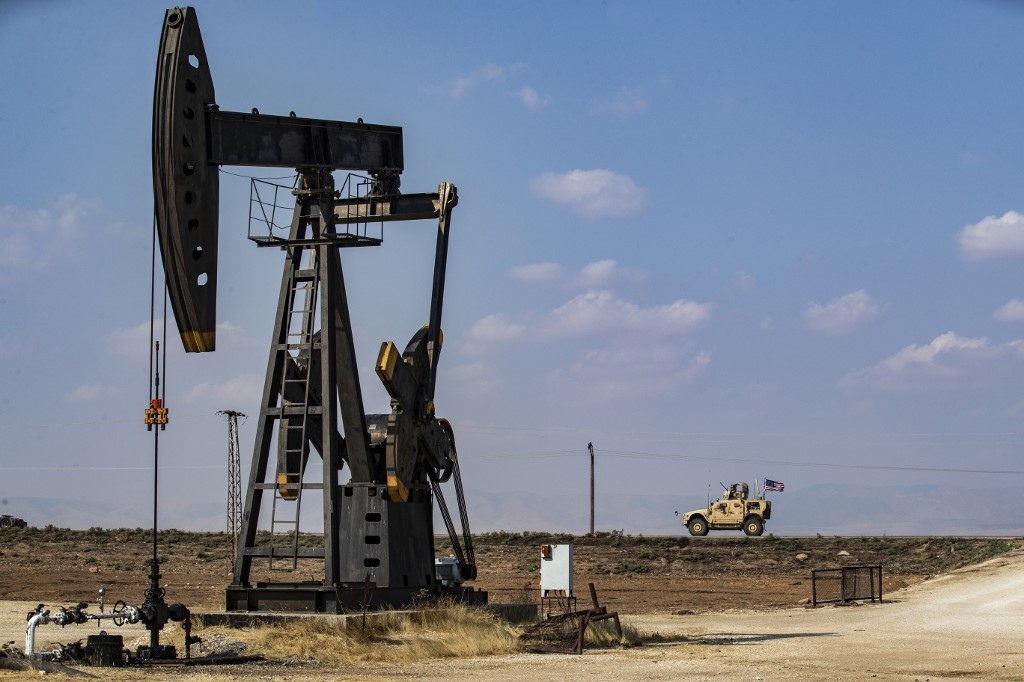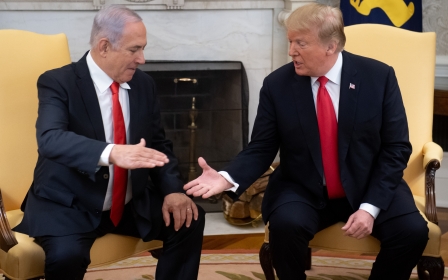Trump's move to 'secure' Syrian oil is out of touch with reality

Since the outbreak of the Syrian crisis, many analysts have suggested that the conflict was "about oil" and a western desire to control Syrian oil production.
This understanding not only denied the agency of the protesters while diminishing their calls for political change, but it also misunderstood the realities of Syria's oil sector. Syria has never been a significant oil producer by regional standards, reaching a production peak of around 380,000 barrels a day before the civil war erupted.
In 2016, an International Monetary Fund working paper estimated that production had declined to just 40,000 barrels per day.
The global insignificance of Syrian oil production, the declining rates and revenues of the industry, and the absence of any new reserves were never enough evidence to convince naysayers that Syria's tragedy wasn't brought about by the geopolitics of oil.
Delusional worldview
New MEE newsletter: Jerusalem Dispatch
Sign up to get the latest insights and analysis on Israel-Palestine, alongside Turkey Unpacked and other MEE newsletters
With US President Donald Trump's recent declaration that US strategy was to "keep the oil" and that US forces had "secured the oil," the theory that oil interests have driven western intervention in Syria has resurfaced.
The Trumpian logic that Syrian oil fields need to be secured for US interests – and that US interests can only be secured through access to oil fields – is a delusional worldview grounded in a misunderstanding of how oil production and markets actually work. Author Robert Vitalis calls this Oilcraft: a way of thinking about oil-as-power that does not correspond to how oil markets shape production and prices.
Syria's oil sector is decimated. Syrians do not even take seriously its revival as a foundation of post-conflict reconstruction
Access and price fluctuations in oil markets are not determined by who controls what at any given time. We simply do not live in a world in which all oil produced in the world is controlled by the military or commercial interests of the US and its allies.
Markets do not function according to who has "secured" access to oil. Producers produce, and consumers consume. These patterns exist independent of what oil fields the US military occupies.
Syria's feeble oil production has little impact on global oil markets. Prior to the conflict, the majority of Syrian oil production that was not consumed domestically was exported to Europe. In 2011, the EU placed sanctions on Syrian oil imports. European companies involved in the Syrian market, including Total and Shell, ceased operations in the country and withdrew personnel.
The threat of sanctions from the US or EU discouraged new commercial investments and partnerships in the Syrian oil sector. The Syrian Petroleum Company (SPC), Syria's public sector enterprise responsible for oil production, was also under sanctions and unable to conduct simple commercial transactions with external partners.
Biting sanctions
With the conflict becoming increasingly violent and sanctions taking a toll on everyday economic life, domestic oil production was geared towards the internal market. Sanctions not only blocked the principal Syrian export market, but they also squeezed the SPC's ability to produce and sell oil to international buyers.
By 2013, many of Syria's oil fields had been under threat or taken over by armed groups that did not have the capacity to produce oil. Some oil fields remained dormant and, in some areas, rudimentary techniques were used to extract oil.
The difficulties of transport and refinement meant that much of the oil trading and consumption was heavily localised, and there was a lot of evidence that various armed groups, including the Syrian army, used oil in barter deals with other groups.
Oil became a minor, but not insignificant, prize in Syria's war economy. Most of the armed groups were content not to contest for control of the oil fields, and instead focused their efforts on other forms of wealth extraction through taxation, kidnappings and the like. Control of oil fields was simply not worth it.
Unlike in other conflict zones, where resources are fought over by different armed groups – such as the case with coltan extraction in the Democratic Republic of Congo – there was no comparable situation in Syria; war economies did not emerge in relation to oil extraction.
The combination of dwindling reserves, infrastructural neglect, and sanctions that have been exacerbated by the conflict means that not even Syrian government planners are looking to the oil trade to finance reconstruction. The debates within Syria today about reconstruction do not revolve on how to restart oil production, or how oil revenues can finance post-conflict spending.
Devastating impacts
Since the early 2000s, Syrian government planners have understood the need to move away from any reliance on oil revenues and the oil sector as a whole. The devastating impacts of the conflict and sanctions on the oil sector have only confirmed what many Syrians already knew – mainly, that the oil sector cannot save the economy.
If Syria's oil production is insignificant, then why would the US military be directed towards controlling the oil fields? There is no apparent reason, other than a bad case of Oilcraft, coupled with a desire by this administration to save face in the aftermath of a perceived retreat from Syria.
The Trump administration's decision to move US forces out of the way of the Turkish military's intervention against the Syrian Democratic Forces was met with bipartisan condemnation, with many decrying the "betrayal" of the US's Syrian Kurdish allies. It appears that the administration sought to mute this criticism through a show of force to secure Syria's oil fields.
That this would be either contemplated or welcomed as an affirmation of the US commitment to maintaining a military presence in Syria is testament to the power of the myth that whoever controls the oil has power. Syria's oil sector is decimated. Syrians do not even take seriously its revival as a foundation of post-conflict reconstruction.
Contrary to what Trump assumes through his public declarations about securing oil, we won't be experiencing reduced prices at the pumps anytime soon. And if we do, it certainly won't be because US troops are occupying Syrian land.
The views expressed in this article belong to the author and do not necessarily reflect the editorial policy of Middle East Eye.
Middle East Eye delivers independent and unrivalled coverage and analysis of the Middle East, North Africa and beyond. To learn more about republishing this content and the associated fees, please fill out this form. More about MEE can be found here.







